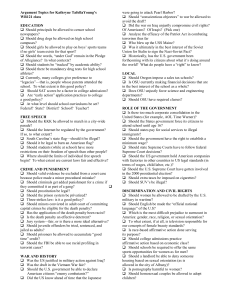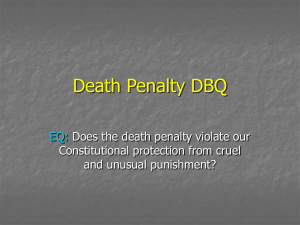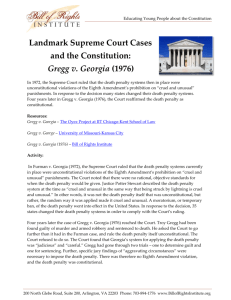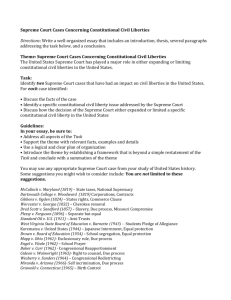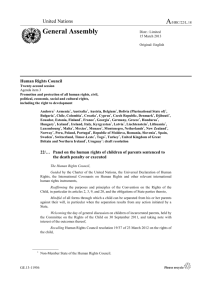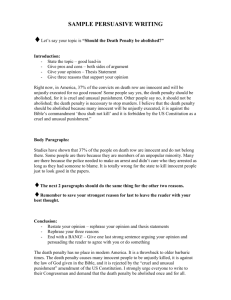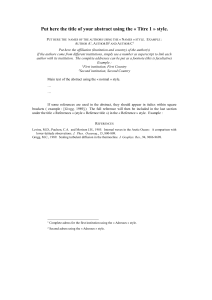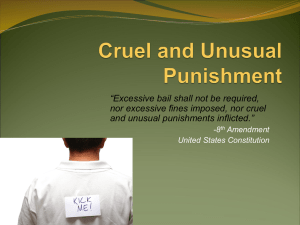The Death Penalty
advertisement
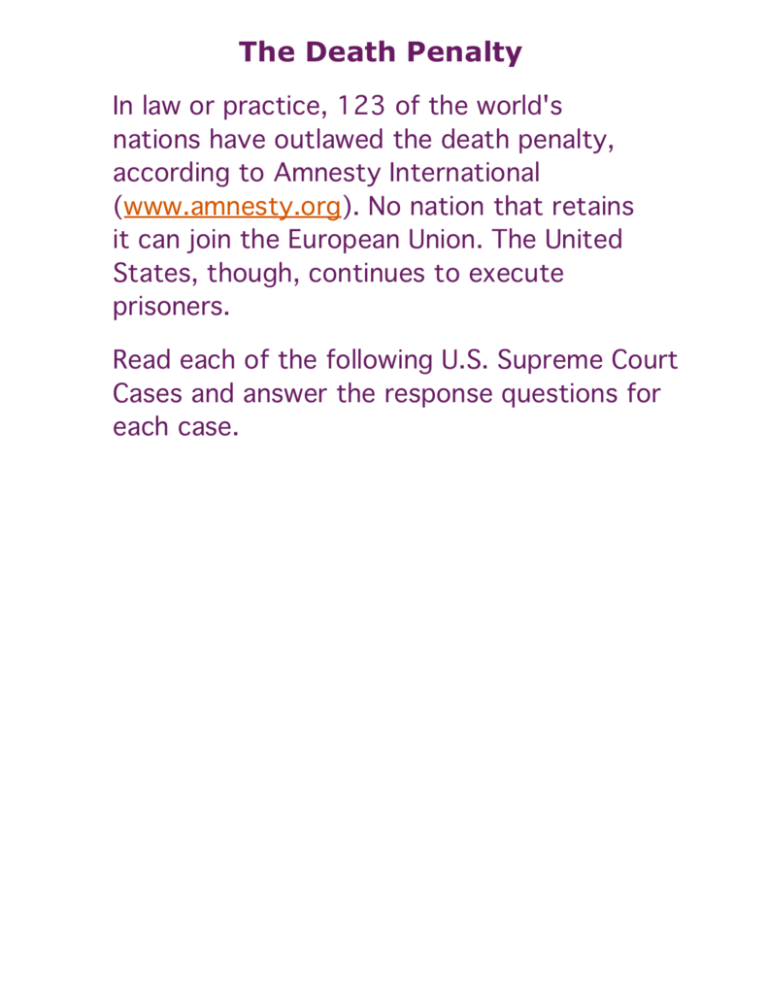
The Death Penalty In law or practice, 123 of the world's nations have outlawed the death penalty, according to Amnesty International (www.amnesty.org). No nation that retains it can join the European Union. The United States, though, continues to execute prisoners. Read each of the following U.S. Supreme Court Cases and answer the response questions for each case. Student Reading 1: Two Supreme Court cases Furman v. Georgia, 1972: While William Henry Furman was burglarizing a home, its owners entered and discovered him. When Furman tripped, his weapon fired accidentally and one of the homeowners was killed. Furman was captured, tried, and sentenced to death. His case reached the U.S. Supreme Court, which decided to consolidate it with that of two rape cases, Jackson v. Georgia and Brown v. Texas. Juries in those cases were not required to give the death penalty, though they did, nor were they given specific criteria for how to judge the accused. By a 7-2 decision, the Supreme Court ruled that in the three cases the penalties provided "cruel and unusual punishment" and were therefore in violation of the Eighth and Fourteenth Amendments to the Constitution. Justice Potter Stewart wrote: "These death sentences are cruel and unusual in the same way that being struck by lightning is cruel and unusual—they are capriciously, freakishly and wantonly imposed." He also stated: "The penalty of death differs from all other forms of criminal punishment, not in degree but in kind. It is unique in its rejection of rehabilitation of the convict as a basic purpose of criminal justice. And it is unique, finally, in its absolute renunciation of all that is embedded in our humanity." Response Questions: 1. Do you agree with the Supreme Court ruling in Furman v. Georgia? Why or why not? 2. Consider Justice Stewart's comparison of the sentences to being struck by lightning. What is "cruel and unusual" about being struck by lightning? What is capricious and freakish about the three sentences of death? What makes the sentences "wantonly imposed"? Gregg v. Georgia, 1976: On November 1, 1973, Troy Gregg and Floyd Allen were hitchhiking north in Florida. Fred Simmons and Bob Moore picked them up. That night they made a rest stop. The bodies of Simmons and Moore were found in a ditch the next day. That afternoon Gregg and Allen, driving in Simmons' car, were stopped and arrested in Asheville, North Carolina. Police found a pistol in Gregg's pocket that was later proved to be the weapon that killed Simmons and Moore. Gregg admitted to the killings but said they were in selfdefense. Gregg and Allen were taken to the scene of the killings. Allen told detectives that Gregg had told him during the rest stop that he intended to rob Simmons and Moore. As they came up an embankment, Allen said, he shot and killed both Simmons and Moore. Allen said he and Gregg then took their victims' valuables and drove off in Simmons' car. At his trial, Gregg again confessed to the killings, but continued to maintain that he had acted in self-defense. The jury found him guilty of first-degree murder and sentenced him to death. Gregg appealed his case to the Supreme Court on the grounds that the death penalty was "cruel and unusual punishment" and therefore a violation of the Eighth Amendment to the Constitution. This time, also in a 7-2 decision, the Supreme Court ruled that the Gregg decision was not "cruel and unusual" and that in the four years between the two decisions, Georgia and other states had named 1) specific factors "to be weighed and the procedures to be followed in deciding when to impose a capital sentence" and 2) made "the death penalty mandatory for specified crimes." Justice Potter Stewart stated: "Whatever the arguments may be against capital punishment, both on moral grounds and in terms of accomplishing the purposes of punishment…the death penalty has been employed throughout our history, and, in a day when it is still widely accepted, it cannot be said to violate the constitutional concept of cruelty." Response Questions: 1. Why did the Supreme Court find that the death penalty was not "cruel and unusual"? 2. What happened between 1972 and 1976 that produced a different Supreme Court ruling? 3. Does Justice Stewart contradict himself in the 1972 and 1976 rulings? If so, how? If not, why not? Student Reading 2 : Two Illinois murder cases The Hobley Case A fire in a Chicago apartment building took the lives of seven people on January 6, 1987. The husband and father of two of the victims, Madison Hobley, 26, escaped the flames, wearing underwear and no shoes. But two police detectives, Robert Dwyer and James Lotito, arrested Hobley the next day as the arsonist. The police officers said that Hobley confessed to the crime. Hobley said that they beat, kicked, and suffocated him with a plastic cover to force him to confess. At Hobley's 1990 trial, four police officers testified that Hobley had gone to a filling station with a can, bought $1 worth of gas, gone back to the apartment house, emptied the gas in a hallway and stairwell outside his apartment and ignited it. His motive, they said, was to have a new life with another woman. The officers said they had not abused Hobley. There was no written record of Hobley's confession. Dwyer said he had taken notes but thrown them away after something was spilled on them. Two men claimed to have witnessed Hobley's gas purchase. One of them, the attendant, failed to recognize Hobley at a police lineup. The other, Andre Council, said he was only a few feet away when Hobley purchased the gas and was still at the gas station when fire engines raced by to the apartment house. The prosecution introduced into evidence a gas can it said Hobley used. He was sentenced to death. The following year Hobley's lawyers brought before the U.S. Supreme Court evidence that the police had withheld forensic evidence that there were no fingerprints on the gas can. They also produced evidence that Council, the prosecution's chief witness, had himself been an arson suspect in a 1987 fire. In 1998, the Supreme Court ordered a further "evidentiary hearing." In an Illinois circuit court following this hearing, the judge ruled against Hobley, confirming the death sentence. (www.law.northwestern.edu) Hobley Response Questions: 1. Based on what you know of the facts of the Hobley case, do you support or oppose the death penalty for him? 2. Once you respond to question #1 read the following additional information about the Hobley case. Do you think the government owes Hobley anything for his time served? Why or why not? Hobley's sentence was overturned through an appeal to then Illinois Governor George Ryan on October 18, 2002. He ruled that Hobley had been "convicted on the basis of flawed evidence" and that "the jury did not have the benefit of all existing evidence, which would have served to exonerate him." Before he was released, Hobley had been in prison for 15 years. (www.law.northwestern.edu) The Brisbon Case On June 3, 1973, Henry Brisbon and three partners forced several cars off interstate highway I-57, south of Chicago. Brisbon made a woman remove her clothes, then shot and killed her. He also made a young couple lie down in a field together, ordered them to "make this your last kiss," and shot both in the back. Brisbon was not caught. But years later when he was in a penitentiary for rape and armed robbery, he confessed the I-57 crimes to a fellow inmate. Because he committed them after the Supreme Court had declared capital punishment unconstitutional in 1972, Brisbon could not be sentenced to death. He was sentenced to one thousand to three thousand years, probably one of the longest prison terms ever imposed. Less than a year later, Brisbon stabbed and killed another prisoner. In 1982, after Illinois reinstated the death penalty, he was sentenced to death following a court hearing that included proof that Brisbon had also shot and murdered a store clerk before his imprisonment. Brisbon has been repeatedly accused of assaults against prison guards, including another stabbing. He also threw a 30-pound weight against the skull of an inmate, severely wounding him. Brisbon Case Response Questions: 1. What do you think of a one thousand to three thousand year prison sentence? 2. What do you think should have happened to Brisbon?
